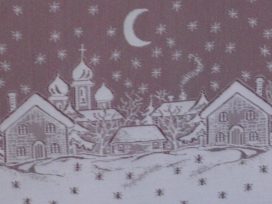
A leading Ukrainian-American writer on grace, justice, power and freedom.
The question of national scientific languages, though one of many issues touching on the relationship of the national and the global, is especially sensitive in the Slovenian context. Whether or not Slovene scientists chose to publish in Slovene is more a matter of values than external compulsion, writes Emica Antoni.
With this issue we conclude a series of social diagnoses which examined the status of Slovene and other European national languages as languages of scientific communication relative to the global language of English. Given the warnings of some Slovene language specialists that Slovene is losing one of its highest functions, that of scientific and academic communication, and the heated debates triggered in academic circles, we wanted first to determine the actual status in practice. Those who are not exactly caught up in the study process (i.e. who are neither university professors nor students) have no way of knowing what takes place during international exchanges of faculty and students. We asked similar questions at Slovenian university departments and the Slovenian Ministry of Higher Education, Science and Technology and, through the European Commission, at university departments elsewhere in Europe. It turned out that decisions regarding the language used in lectures at European universities (especially within the framework of international exchanges) were taken at the lowest or operative level. The European community leaves the organization of educational systems, teaching content, and linguistic policy up to member states. But the laws of member countries (including the Slovenian law on higher education) are often vague (the statute of the University of Ljubljana, for example, refers to “a larger number” of foreign students) or leaves the resolution of the issue up to individual members, i.e. faculties (University of Maribor, University of Primorska). Thus ultimately the decision is made at an operative, everyday, pragmatic level.
The small number of Slovenian and European deans who responded to our questions could perhaps be explained in various ways, but the final impression we are left with is that we asked our questions too soon, before many of them had even thought about the issue, and hence they are not yet ready to deal with it. The ones who answered were those who had already formed a clearly defined opinion (and roughly speaking their view is that English is an important tool enabling global scientific communication, but that it is necessary to preserve national scientific languages as well and to resist the communicative tyranny of English), and those who have already begun systematically tackling it. The University of Helsinki, one of the most highly ranked European universities, adopted a new linguistic policy this spring: it includes internationalism, multiculturalism, and multilingualism as values, but specifies Finland’s two national languages (Finnish and Swedish) as the main languages of instruction and requires that foreign undergraduate students carry out a portion of their studies in these languages. Postgraduate students are not required to do this, but they are nevertheless provided with the opportunity to pursue their studies in both national languages. Exchange students can choose from a wide choice of subjects in different languages. Clearly it is possible to find a model which encourages internationalism while at the same time protecting the national scientific language.
The question of national scientific languages is just one of many issues touching on the relationship of the national and the global, but compared to, for instance, the question of the capital independence of national economies or legislative and judicial independence, it is most recognizable from the outside. Language is the last thing on which a nation stands or falls. The loss of a language’s higher functions, and the introduction of English into science and higher education, caution some Slovene specialists, can merely be the beginning of a process which will eventually spread to lower levels of education and other areas of life.
The language question is especially sensitive in the Slovenian context: up until 1991, when Slovenia gained the status of an independent state, the identity of Slovenes as a nation was built primarily around language and the culture created in that language. The lessons of Slovenian national history emphasize the power of language in preserving a nation from continuing denationalization and subjugation. But in deciding whether or not to preserve and further develop Slovene as a scientific language, we no longer have a case of resistance against an external enemy or a struggle for survival, since there is nothing to prevent us from preserving the use of Slovene in academic communication. No one is forcing us to adopt English, no one is banning the use of Slovene: we are perfectly free to choose between (at least two) alternatives. Globalization presents entirely new dilemmas. Of course we can conclude that the modern development of science demands the publication of research in English if we want to have an impact in our fields, but no external force is preventing us from publishing research results in Slovene (and consequently lecturing and developing scientific terminology in Slovene). A Slovenian physicist freely decides whether his or her articles will be published in English only or also in Slovene, a Slovenian bureaucrat in Brussels freely decides whether his or her child will study Slovene in a European school, the senate of a Slovenian university freely decides on whether and how to regulate the use of foreign languages during international exchanges at their institution. But this freedom of choice is essentially a question of values. If the people in the cases mentioned regard Slovene as an important value, then they will decide in its favour, or in combination with other values. But if Slovene is no longer a value for them, they will give higher priority to other values, for example, to career opportunities abroad.
For the Slovenian cultural elite, the most vocal representatives of which are usually writers, Slovene remains a value even at a time of globalism. Similarly, it is a value in the humanities and social sciences, whose subjects of research are Slovenes, Slovene language, culture, history, etc. However, while biologists continue to update their terminological glossaries with Slovene expressions, a number of technologists, physicists, and chemists do not regard it as necessary, and they also publicly state that the use of Slovene in their fields does not sufficiently contribute towards the advancement of their careers. Most intellectuals avoid the problem altogether and remain silent on the issue, since from the national standpoint it is a highly sensitive one. Would they dare assert that the existence of Slovenes as a nation is no longer important? Would other Europeans dare say that about their nations?
But we live in a democracy, and so we will decide freely. The end result in the future will show what that decision was, and which values won out.
Published 10 December 2007
Original in Slovenian
First published by Dialogi 9/2007 (Slovenian version)
Contributed by Dialogi © Emica Antoncic / Dialogi / Eurozine
PDF/PRINTSubscribe to know what’s worth thinking about.

A leading Ukrainian-American writer on grace, justice, power and freedom.

Remaining in a new country or returning home? The Knowledgeable Youth podcast delves into the complex decision-making refugees face when migrating, together with researcher Olena Yermakova.